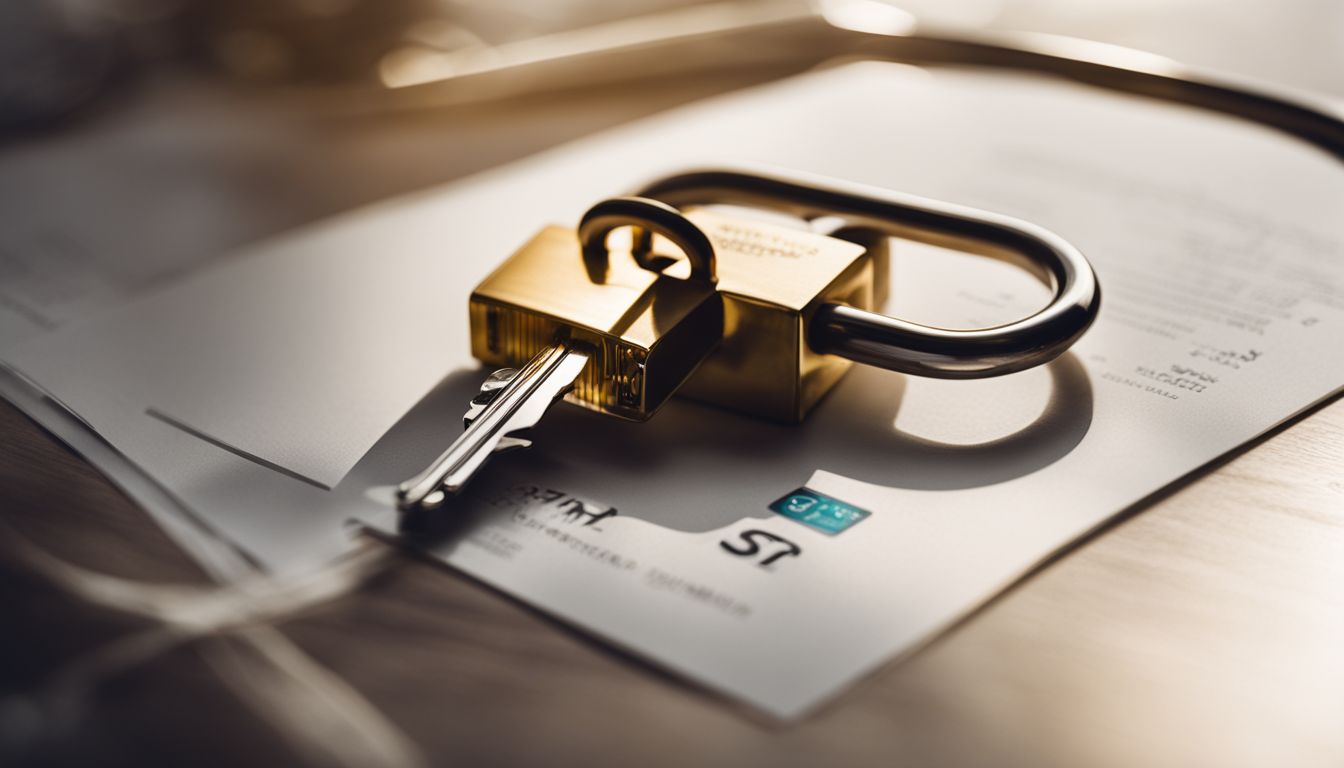In today’s digital world, everyone wants a safe online experience. SSL certificates are key in protecting websites and their visitors. Our article explains how these certificates work to secure your site and gain trust from users.
Keep reading to unlock web security secrets!
Understanding SSL Certificates

SSL certificates play a crucial role in website security by encrypting data and establishing trust between the website and its visitors. There are various types of SSL certificates that offer different levels of validation and security.
The Role of SSL Certificates in Website Security
SSL certificates are like secret codes for websites. They make sure that when someone talks to your website, the chat stays between just you two. This stops others from listening in or stealing information.
Think of it as sending a letter in a locked box instead of a clear envelope.
Having an SSL on your site shows customers you care about keeping their details safe. It’s like wearing a badge that says “I can be trusted”. When shoppers see this, they feel more at ease buying from you.
So, these certificates don’t just lock up data; they open the door to more business too.
Various Types of SSL Certificates
- Domain Validated (DV) Certificates: These are the basic kind and prove you own the domain. They don’t check who is behind the business. DV certificates can be set up quickly, making them good for personal websites or small blogs that don’t handle much user information.
- Organisation Validated (OV) Certificates: These need more checks than DV ones. The certificate authority will confirm your company’s details. This gives visitors more trust because they see your business is real.
- Extended Validation (EV) Certificates: EVs offer the highest level of validation. They require thorough checks of your business by the certificate provider. EVs turn the browser bar green and display your company’s name, showing visitors a high security level.
- Multi-Domain SSL Certificates: You can protect several domains with one of these certificates. That makes it easier if you run multiple sites or services.
- Wildcard SSL Certificates: These secure a domain and an unlimited number of its subdomains. They’re useful if you have one main site with lots of sections, like a shop or a blog area.
- Unified Communications Certificates (UCC): Originally designed for Microsoft Exchange servers, UCCs now work well for businesses with many names for their service or platform, as they cover multiple domain names within one certificate.
The Functionality of SSL Certificates

SSL certificates work by encrypting data, creating a secure connection, and upholding the “handshake of trust” between the website and its visitors. This functionality helps to build confidence and credibility in online transactions and communications.
How SSLs Encrypt Data and Build Trust
SSLs use special codes called encryption algorithms to mix up data so only the right person can read it. Imagine you’re sending a secret letter that only your friend has the key to decode.
That’s what SSL does with online information. It scrambles the data when it’s sent and then unscrambles it safely at its destination. This way, no one who isn’t supposed to see your details can make sense of them.
Having SSL on your website shows customers you care about keeping their info safe. It creates a secure space where people feel okay to do business with you. They see the little padlock icon in their browser or https:// before your web address and know it’s safe to enter their personal details.
This builds trust between you and them, making sure they are happier shopping on your site because they believe in its security.
Upholding The “Handshake of Trust”
SSL certificates are like a secret code between your website and its visitors. They make sure no one can sneak a peek at private information as it travels across the internet. By using this secret code, you show customers you care about keeping their details safe.
This “handshake of trust” is not just about locking data away; it’s a promise that you put your customer’s security first. It tells them that shopping or sharing info with you is safe, building a strong bond of trustworthiness right from the start.
The Importance of SSL Certificates
Enhancing website security is crucial for protecting customer information and building trust with visitors. Skipping SSL certificates can lead to high costs, making it essential to implement strategies for safeguarding online data.
Enhancing Website Security
SSL certificates add a strong layer of security to your website. They work by creating a secure connection between your site and the user’s browser. This means any data shared is scrambled into code that only you and your visitor can understand.
Hackers find it tough to steal this encrypted information.
Using SSL protects not just login details but also personal info like addresses and credit card numbers. It shows customers you take their safety seriously, which makes them more likely to trust your site.
In today’s online world, building digital trust is key for any business owner who wants to keep shoppers safe and keep them coming back.
The High Costs of Skipping SSL Certificates
Skipping SSL certificates may seem like saving money, but it can lead to serious problems. Without SSL, your website is not secure. Hackers can easily steal personal details from visitors.
This could include credit card numbers or passwords. If this happens, you might lose customers’ trust.
Also, Google and other search engines rank secure websites higher. So, if you don’t have an SSL certificate, your website could be harder to find online. And if customers feel they can’t trust your site with their information, they won’t buy what you’re selling.
This means less money for your business and a damaged reputation that’s hard to fix.
Strategies for Protecting Customer Information on Your Website
The high costs of ignoring SSL certificates should never be overlooked. Here are strategies to ensure your website keeps customer information safe:
- Install an SSL certificate on your website. This is a must for any site, especially those that handle sensitive customer data. It encrypts the info customers share with you, keeping it secret from others.
- Regularly update your SSL certificate. Make sure it’s always current so your website stays secure and trusted.
- Choose the right type of SSL certificate. There are different kinds for various needs. Pick one that fits your business and protects all parts of your site.
- Show customers your website is safe. You can do this by displaying security badges or symbols once you have an SSL certificate in place.
- Educate your visitors about online trust. Let them know what a secure connection looks like and why it matters.
- Make sure the address bar shows a padlock icon on your site. This tells users that their connection to your website is secure.
- Use HTTPS instead of HTTP in your web address. This change means all the data sent to and from your site is encrypted.
Obtaining and Identifying SSL Certificates
When it comes to getting an SSL certificate for your website, the process can vary depending on your hosting provider. It’s important to understand the steps involved in obtaining and identifying the right SSL certificate for your specific needs.
The Process of Obtaining an SSL Certificate
Obtaining an SSL certificate involves a few key steps:
- Choose a Certificate Authority (CA) to purchase the SSL certificate from.
- Generate a Certificate Signing Request (CSR) and a private key on your web server.
- Submit the CSR and other required information to the chosen CA for validation.
- Once validated, the CA will issue the SSL certificate.
- Install the SSL certificate onto your web server to enable encryption for your website.
How to Identify if a Website has an SSL Certificate
To identify if a website has an SSL certificate, look for the HTTPS at the beginning of the URL. This indicates a secure connection and assures that data sent between your browser and the website is encrypted.
Additionally, clicking on the padlock icon in the address bar will confirm the presence of an SSL certificate, providing peace of mind regarding the security and authenticity of the website.
The Certificate Chain of Trust
The Certificate Chain of Trust plays a crucial role in the validation and authentication of SSL certificates, consisting of the root certificate, intermediate certificate, and server certificate.
Understanding this chain is essential for website owners to ensure their websites are secure and trustworthy for their visitors.
Root Certificate: The Trust Anchor
A root certificate, also known as the trust anchor, is a crucial part of website security. It’s like the foundation that holds the entire system together. Imagine it as the key to a locked box – without it, you can’t be sure if what’s inside is safe.
In the world of SSL certificates and website security, this trust anchor ensures that everything else falls into place securely. The root CA certificate forms the basis of trust for all other certificates in the chain, providing a secure starting point for building trust within your website infrastructure.
The root certificate plays a significant role in securing online transactions and protecting sensitive information shared by users on your website. It serves as a fundamental part of what makes SSL certificates reliable and trustworthy.
Intermediate Certificate: The Issuing CA
The intermediate certificate, also known as the issuing CA, plays a crucial role in the chain of trust for SSL certificates. It acts as a bridge between the end-entity server certificate and the root certificate.
This means that it helps to verify the authenticity of the server’s SSL/TLS certificate by being signed off by a trusted root and forms an essential part of establishing trust in secure communications.
Without this intermediate step, there would be no way to link your website’s SSL/TLS certificate back to one of these globally trusted roots. Thus, it’s vital for business owners to understand and ensure their websites possess not only an end-user certificate but also an unbroken chain leading back to a trustworthy root authority.
Server Certificate: The End-Entity
When a user visits a website, the server certificate, also known as the end-entity certificate, plays a crucial role in establishing trust. This certificate is issued to the specific web server domain and confirms its identity.
It holds the public key that enables secure communication between the server and the user’s browser using encryption technology. Verifying this server certificate is vital for ensuring that sensitive data shared on your website remains secure.
Understanding how your website’s server certificate works will help you protect your customers’ information effectively. Up next, we’ll delve into strategies for safeguarding customer data on your website.
Conclusion
In conclusion, SSL certificates play a crucial role in website security by encrypting data and establishing trust with users. These certificates are essential for maintaining secure online interactions and building credibility with customers.
Understanding the functionality and importance of SSL certificates is vital for businesses to protect customer information and establish a trusted online presence. Embracing SSL certificates not only enhances website security but also strengthens the bond of trust between organisations and their valued customers.
For comprehensive guidance on safeguarding customer data, explore our dedicated piece on strategies for protecting customer information on your website.



